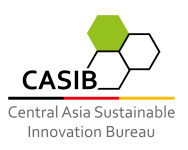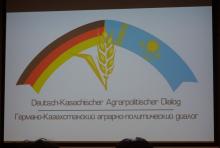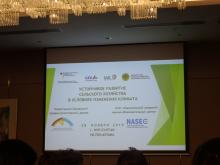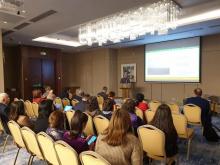On November 28, the German-Kazakh Agro-Political Dialogue and the National Centre of Agricultural Research and Education jointly hosted an international symposium on "Sustainable Development of Agriculture in the Face of Climate Change" in Kazakhstan's capital Nur-Sultan (formerly Astana), where head of bureau Peter Liebelt and intern Clara Baier presented the project office and spoke about strategies for more efficient water use in the (irrigated) agriculture of Central Asia.
The German-Kazakh Agro-Political Dialogue is a project funded by the German Federal Ministry of Food and Agriculture that has been pursuing the objective of intensifying the political and economic cooperation between the German and Kazakh agrarian sectors since October 2009. The APD, therefore, works closely together with the Kazakh Ministry of Agriculture and supports the Kazakh partners in creating an agro-political framework that allows for enhanced use of the country's agricultural potential. Today, more than ever, further development of agriculture requires the consideration of imminent challenges related to climate change and protection.
In this context, the conference aimed at initiating a dialogue and creating a platform for exchanging information on climate change and its impact on agriculture as well as possibilities for mitigation and adaptation to the changing conditions – with plenty of room for discussing specific, effective political and economic measures. Many participants, especially Dr. Daniel Müller from the Leibniz Institute of Agricultural Development in Transition Economies (IAMO), began by visualising the current state and expected consequences of climate change on agriculture as well as many other parts of Central Asia's natural environment and living situation.
From the Kazakh side, decision makers and representatives of the government, universities, research institutes, business centres, financial institutes, and public organisations attended the event. Galiolla Meirman from the Kazakh Research Institute for Agriculture and Crop Production presented current investigations about the employment of wild lucerne species to increase adaptability. Dani Sarsekova from the chair of forest ressources and forestry contemplated the effect of climate change on the country's forests. Questions related to soil, livestock cultivation, and the spread of infectuous diseases were raised as well.
Among the attending German scientists with long-standing research activities in the region were Prof. Dr. Georg Guggenberger, head of the institute of soil science at Leibniz University Hannover and coordinator of the CLIENT II project ReKKS, and Prof. Dr. Martin Petrick, agricultural economist at Justus Liebig University Gießen. Both used their former and current research to derive specific recommendations for action for the Kazakh agricultural policy and practice.
The division of the event into short presentation sections enriched by subsequent rounds of discussion with all speakers of the respective section made the conference diverting and provided ample opportunity for animated, productive discourse. Considering that many of the CLIENT II projects that are currently being implemented in Central Asia fall into the category 'land management and adaptation to climate change', this exchange of information with the resulting contacts was particularly valuable for us a regional project office.
- Log in to post comments



